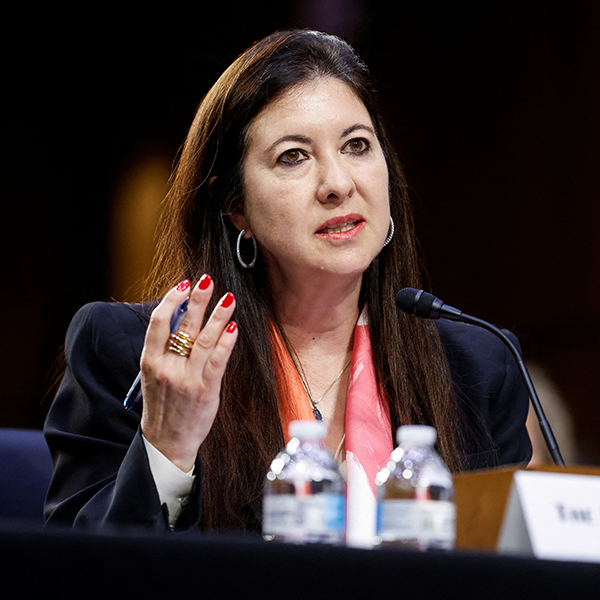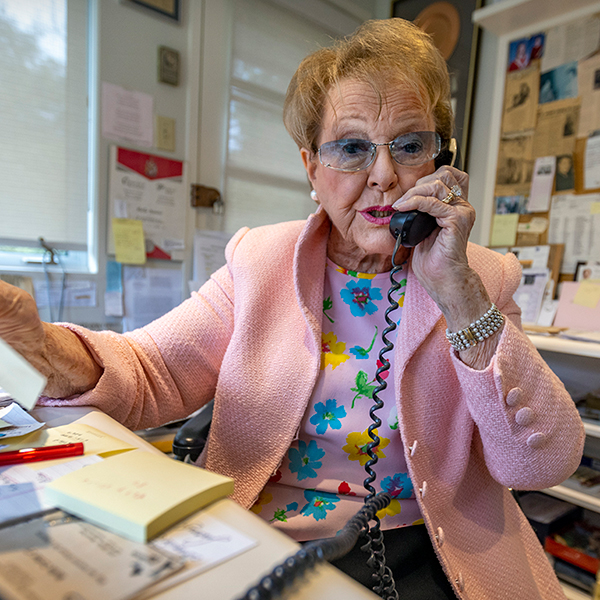There’s much more to a sommelier competition than simply tippling wines. A skilled sommelier has to be prepared to address any beverage concern they might encounter in a restaurant on a Saturday night, from making a cocktail, to suggesting a sake, to discerning if a wine has faults.
“Tasting is hard, service is hard. But how you can make it seem simple to your guests is the key,” says Hugo Duchesne, MA’02.
Duchesne is one of the finest sommeliers in the province – in fact, he was named Quebec’s best sommelier in 2019. Earlier this year, he represented Quebec and Canada at the Association de la Sommellerie Internationale’s Best Sommelier of the Americas competition in Santiago, Chile, and earned second place.
A video recording of the competition’s finals makes for tense viewing and shows three of the most knowledgeable sommelier/es of the Western Hemisphere performing tasks such as decanting, pouring and describing wine to a table of judges roleplaying as restaurant guests; identifying six glasses of colourless spirits (pisco from Peru or grappa from Italy?) in four minutes; selecting six wines from a list and smoothly presenting an improvised tasting menu to pair with them. And they did it all in their second language.
To get to the finals, 20 sommeliers first had to contend with a 100-question, 90-minute exam, taste and sum up tricky wines, and demonstrate smooth service capacity. Of those 20, six went to the semifinals. “It’s so hard to be in the six,” Duchesne says. “When they say your name? The joy you feel!”
The semis were even tougher than the finals, Duchesne found, with a devilishly challenging tea component in which dry loose leaves were placed in six different bowls. The competitors had to identify them visually (not by smell) state the ideal brewing and serving methods, and suggest food pairings. All within four minutes.
But the hardest part of the competition? “To be able to deal with your stress,” says Duchesne.
There was a surprising camaraderie among these top somms. “It’s not a team against a team, it’s yourself against yourself,” Duchesne explains. They quizzed each other in the off-hours, challenging their peers to “name five producers from the Maule region of Chile, or give me a five-course menu with only American wine pairings.”
While pursuing his graduate studies at McGill in what is now known as the Département des littératures de langue française, de traduction et de création, Duchesne worked at Fromagerie Hamel in Jean Talon Market. The owner was a wine enthusiast, who had boxes of private imports delivered to the store. Duchesne would read the labels with interest. “Wine was a promise of so many flavours, knowledge, travels.” He likened the experience of tasting and learning about a wine to the satisfaction gained from reading a book – discovering the different regions and producers, how each worked the land, the grapes’ distinctive characters. “That’s live poetry! I always loved it,” he says.
When cheese sales were good, the owner might pop open some bottles to taste. Sometimes he’d bring the team to Montreal’s best restaurants, where Duchesne met the servers who’d come to their table to talk about wines, the menu, and consult with the chef.
While Duchesne expected to carry on with his academic pursuits, he was becoming increasingly enthralled with the world of wine and decided he needed to learn more. He took a break after completing his master’s degree to do a one-year diploma in sommellerie.
He applied the disciplined study habits he had honed at McGill under demanding professors like Yvon Rivard and François Ricard, MA’68, “the toughest literature teacher in Quebec,” Duchesne says of the latter. Duchesne’s thesis was on Milan Kundera (favourite book? Life is Elsewhere). “I was proud to go to McGill and then to succeed at McGill,” says Duchesne. “If I could just continue to keep this rigour in my professional life, that would be a nice [takeaway].”
After a brief stint working in restaurants, he opened his own, the lauded and tiny Montée de Lait on a residential street in the Plateau. Currently he is wine director at Montreal restaurant h3 and Le Coureur des bois in Beloeil, and sometimes teaches at the SAQ.
Owning a restaurant meant crazy hours, but now as a head sommelier Duchesne can be home most nights for his three young kids (11, 8, and 5). “Life goes so fast,” Duchesne says, “but at least I stop and try to appreciate the moment. Life is now.”
He approves of the recent trend of lighter, easy-drinking wines, and is happy to see that wine drinkers are asking tougher questions about the industry’s environmental impact. He predicts that we will keep seeing an increase in the popularity of natural and organic wines, made the way they were before the First World War, when industrialization began maximizing yields and encouraging interventions such as adding sugars and yeasts to create a product. “We are returning to what our grandparents used to do.”
Duchesne believes that locally produced wines will become more the norm. “A wine list, in 20 years, the first 25 items will be from close to our house,” he predicts.
Not surprising then that Duchesne has an appreciation for Quebec-produced wines, which use hybrid grapes that work well for our particular climate, tending towards high-acid, and low-alcohol. He thinks Quebec vintners are becoming more confidant and ready to take risks, like perhaps reaching for a little more ripeness in the fruit.
For the most part, Duchesne is wary of trends. Hipsters may flutter to a wine labelled “organic,” “nature,” or “orange” (a subset of white wines that are left on the skin for a while during fermentation). But in the rush to cash in on the latest craze, some wines are produced sloppily and develop imperfections (a risk for any wine) and some sommeliers don’t pause to perceive excess volatile acidity or oxidation, because they’re too enamoured with the beguiling narrative behind the newest fad. “There’s a trend that no matter the [imperfections], they will drink the philosophy behind it.”
And for those wanting to learn more about wine, Duchesne gives the same advice he does to his students and his restaurant guests. “Trust yourself.
“Trust your senses. Write down what you like about a bottle, create a small library.” If you enjoyed a Sangiovese, the notes of violets and peonies, the herbal tones of oregano or sage, or noticed how the wine’s acidity diminished the acidity of the food, keep a record of your preferences. Make a point of consulting with your local SAQ salesperson or a sommelier, mention you liked a certain bottle, and they’ll be happy to direct you to a similar one. “And be open-minded.”
Cheese, meet wine
Wine and cheese don’t always go hand in hand. And that makes sense when you think about how the regions best known for wine production and cheese making don’t usually overlap. That said, Hugo Duchesne prefers pairing cheeses with mature wines that have no tannins, and not too much aromatic structure. And white wines are generally a better match for cheese than the reds that are typically used. Duchesne favours classic regional pairings, such as a comté de Gruyère with a wine from Jura with Savagnin grapes. Or goat cheese with a high acid wine, or salty cheddars with salty-sweet wines like Madeira. A camembert fermier and a bold, high-quality French Chardonnay. Plan your picnics accordingly.


